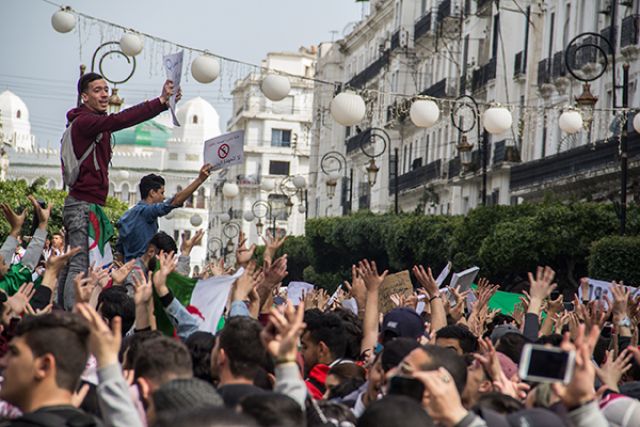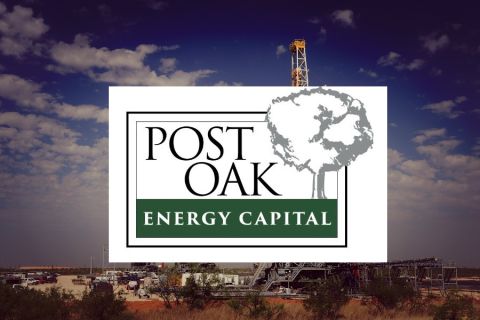
Anti-government protesters in Algeria on March 5, 2019. (Source: Shutterstock.com)
The ongoing political instability in Algeria is casting a shadow on the future of the energy sector and the ambitious Sonatrach 2030 strategy unveiled by Sonatrach’s CEO Abdelmoumen Ould Kaddour last year. The wind of changes may sweep up the national oil company Sonatrach sooner than expected.
Local media reported that Sonatrach’s CEO, Abdelmoumen Ould Kaddour, is set to be removed from his position soon and will be replaced by Mustapha Hanifi, who is currently director general of hydrocarbons at the Ministry of Energy.
“His departure is almost confirmed, it’s just a matter of days or weeks,” reported Bourse-DZ and AlgeriePatriotique.com.
Sources close to the company also confirmed the reports and said that the CEO has informed staff and business partners that he doesn’t expect to remain in his position.
“During a meeting with an event organizer, Ould Kaddour informed people at the meeting that he can’t commit for a second edition of Algeria Future Energy conference, which is set to be held in October 2019, as he is not sure about his future in the company, as he could be replaced very soon,” sources familiar with the issue said under the condition of anonymity.
“He didn’t want to discuss any future business plans,” the source added.
Furthermore, local media said that the reason behind Ould Kaddour statement is the decline of Sonatrach’s revenues during the fourth quarter 2018, which is one of the reason behind the anticipated departure of Ould Kaddour.
“The government was disappointed by the results posted by Sonatrach during the fourth quarter 2018, which are set to be published publicly soon,” reported local website Bourse-DZ. The results will be published over the next few weeks.
Added to that, the political instability amid the ongoing large-scale protests against the candidacy of the ailing President Abdelaziz Bouteflika for a fifth term in April 18 presidential election, is another reason that could have triggered Kaddour’s prediction about his future, where any change of the current regime means a change at Sonatrach.
“Sonatrach provides 98% of Algeria’s foreign income, and its revenues account for 60% of the state budget, making it the focus of struggles for wealth and power rival power centres inside the government for decades,” said Walid Namane, a Dubai-based Political Risk Analyst at Control Risks. “The reported departure of Ould Kaddour indicates that the next government is likely to attempt to reconfigure the political and economic landscape after the presidential elections. The dismissal of Ould Kaddour, in this context, would be part of broader political agreements to ensure a smooth transition towards a post-Bouteflika era.”
Despite the gloomy outlook hovering around, the oil and gas production from the country is unlikely to be affected, as the country is no stranger to security risks. It managed to maintain oil and gas facilities safe during the country’s civil war in the 1990s (also known as the “black decade”), which resulted in more than 200,000 victims. It also persevered through a 2013 attack, where terrorists linked to Al Qaeda killed 40 workers at the In Amenas gas plant operated by Statoil ASA, BP and Sonatrach.
Political unrest against ailing President Abdelaziz Bouteflika, who is running for yet another term in April’s elections despite his health issues, is unlikely to have any impact on oil production. However, it’s too early to assess the impact of protests on oil production and whether employers at fields will join rallies in the coming days and weeks, especially as labor unions of various industries join the protests and call upon energy sector employees to join.
“Current political unrest in the country has not damaged the energy sector’s operations. Most of Algeria’s oil and gas assets are protected by extensive security measures capable of dispersing protestors should these facilities become a target. However, the protest movement does not have any official or known leaders, making it difficult to anticipate its actions or measure its intent to specifically disrupt oil and gas operations,” Namane said.
Furthermore, the much anticipated amendment of the hydrocarbon law won’t be issued any time soon, though international oil companies operating in the country were hoping to see the amendment in June 2019. There were talks that the regulatory agency Alnaft (Agence Nationale pour la Valorisation des Ressources en Hydrocarbures) is set to announce the amendment sometimes during the first half.
“The long-awaited amendments of the hydrocarbon law will not be issued anytime soon. Because of its importance, the law requires less political uncertainty and a consensus among major civilian and military stakeholders on the next five years redistribution of power. In addition, the government is more concerned with ensuring its stability and implementing a smooth and consensual succession to Bouteflika’s rule in the next months,” Namane said.
The ongoing uncertainty hovering over the country is set to have a toll on the future of the country’s energy sector, which is already behind in term of using latest technology in its fields. That technology lag has resulted in a lower recovery rate.
Sonatrach has a recovery factor of less than 20%, compared to 34% in Egypt. Through the Sonatrach 2030 (SH2030,) the CEO has big ambitions. “By 2030, we aim to become the fifth largest NOC in the world, combining our oil and gas reserves, production, refining capacity as well as the commercialized volumes of our different products,” Ould Kaddour said while making the announcement of the strategy last year.
The SH2030 strategy includes 30 initiatives that revolve around three main pillars. This expansion hinges on a stable political leadership and a new set of laws that can attract foreign investors. Algeria’s energy industry has cycled through five ministers and six Sonatrach chief executives since 2010. And the current situation is nothing a new for a company that is used to it, where indecision and red tap are common practice.
Recommended Reading
Patterson-UTI Braces for Activity ‘Pause’ After E&P Consolidations
2024-02-19 - Patterson-UTI saw net income rebound from 2022 and CEO Andy Hendricks says the company is well positioned following a wave of E&P consolidations that may slow activity.
Permian E&P Midway Energy Partners Secures Backing from Post Oak
2024-02-09 - Midway Energy Partners will look to acquire and exploit opportunities in the Permian Basin with backing from Post Oak Energy Capital.
NGL Energy Partners Announces Cash Distribution
2024-02-08 - Payments to holders of NGL Energy Partners’ Class B and C preferred units will be made Feb. 27.
Magnolia Appoints David Khani to Board
2024-02-08 - David Khani’s appointment to Magnolia Oil & Gas’ board as an independent director brings the board’s size to eight members.
Murphy Oil Names Eric Hambly as President, COO
2024-02-08 - Murphy Oil has promoted Eric M. Hambly to president and COO and E. Ted Botner to executive vice president. Both will continue to report to CEO Roger W. Jenkins.





